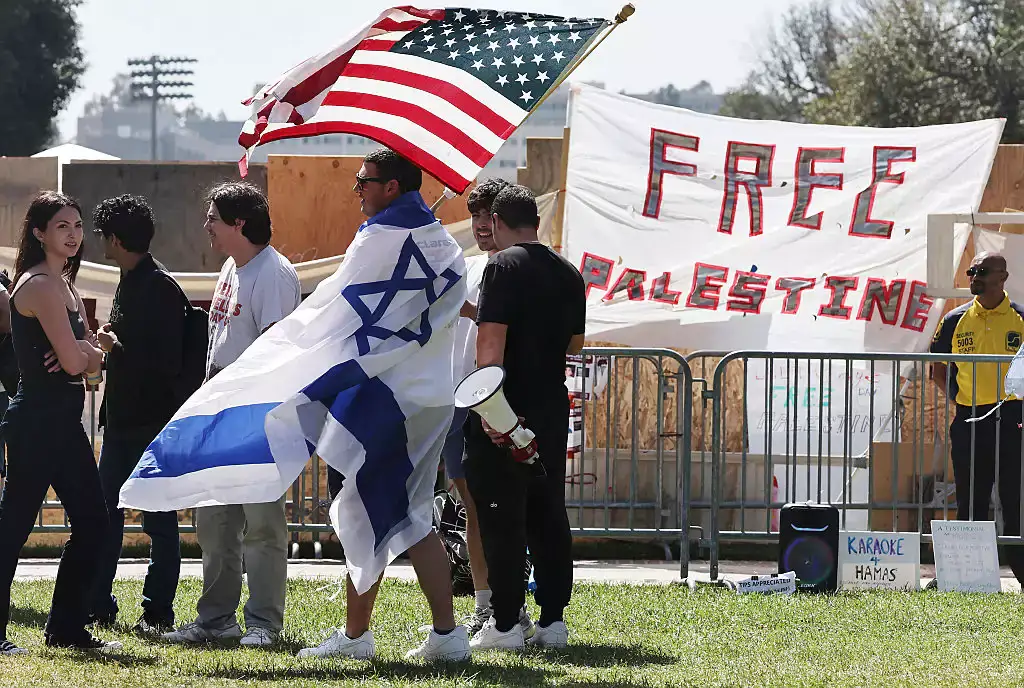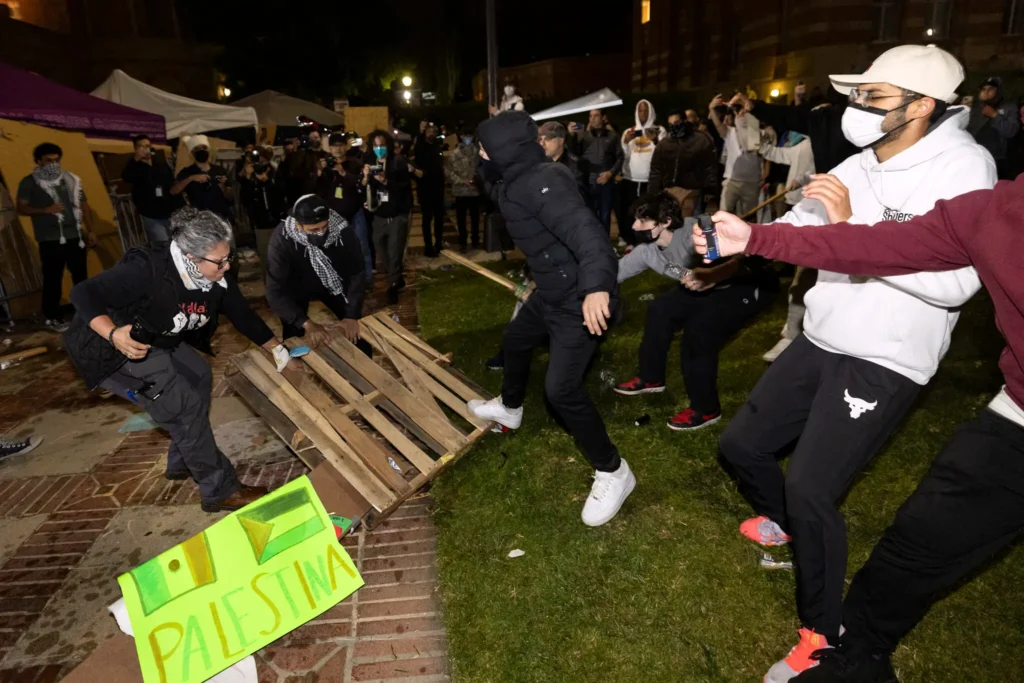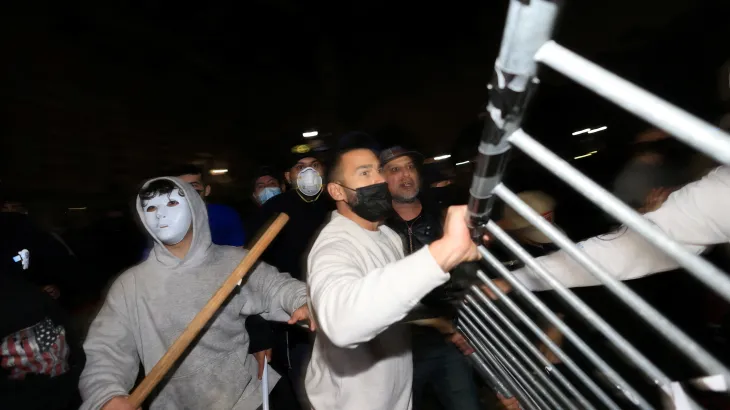Introduction:
The University of California, Los Angeles (UCLA), known for its diversity and vibrant student activism, recently witnessed heated clashes between pro-Palestinian protesters and Israel supporters. The incident, which unfolded on campus grounds, has sparked widespread debate and drawn attention to the ongoing tensions surrounding the Israeli-Palestinian conflict.
The incident underscores the deeply entrenched divisions and passionate convictions held by individuals on both sides of the issue. Pro-Palestinian protesters, advocating for justice and rights for Palestinians, clashed with Israel supporters who staunchly defend the nation’s right to self-defense and sovereignty. What began as a demonstration of divergent viewpoints quickly escalated into physical altercations, leaving many shocked and concerned.

The events at UCLA have reverberated far beyond its campus boundaries, sparking widespread discourse and drawing attention to the broader context of the Israeli-Palestinian conflict. Media coverage and social media discussions have amplified the significance of these clashes, prompting reflections on the complexities and challenges inherent in seeking resolution to this longstanding dispute.
In the aftermath of the clashes, questions arise regarding the implications for campus culture and the ability to foster constructive dialogue amidst contentious issues. As a beacon of higher education and intellectual inquiry, UCLA faces the imperative of nurturing an environment where diverse perspectives can be expressed and debated without resorting to violence or intimidation.
Ultimately, the clashes at UCLA serve as a stark reminder of the deep-seated divisions and passionate convictions surrounding the Israeli-Palestinian conflict. As the university community grapples with the aftermath of these events, there is a pressing need for reflection, understanding, and a renewed commitment to peaceful dialogue and coexistence.
Understanding the UCLA Clashes:
The clashes at UCLA underscore the deeply polarized nature of discussions surrounding the Israeli-Palestinian conflict. Pro-Palestinian protesters, advocating for justice and human rights for Palestinians, were met with opposition from Israel supporters, who assert the right of Israel to defend itself and condemn what they view as biased narratives against the nation.
The clash of these perspectives at UCLA reflects broader societal divisions and ideological fault lines surrounding the Israeli-Palestinian conflict. Emotions run high as individuals on both sides passionately articulate their positions, often with little room for compromise or reconciliation.
The clashes also highlight the power dynamics at play within the discourse surrounding the conflict. While pro-Palestinian protesters seek to amplify the voices of marginalized communities and challenge the status quo, Israel supporters wield their influence to defend the legitimacy of the Israeli state and counter narratives they deem as delegitimizing or harmful.
In the aftermath of the clashes, there is a pressing need for reflection and dialogue to bridge the gaping divides that have been laid bare. Constructive engagement, informed by empathy and a willingness to listen, can pave the way for greater understanding and ultimately, pave the path towards a just and lasting resolution to the Israeli-Palestinian conflict.

Escalation and Violence:
Reports indicate that the confrontations between the two groups escalated rapidly, with verbal exchanges turning physical. Pro-Palestinian protesters allege that they were subjected to physical attacks and intimidation tactics by Israel supporters, while the latter argue that they were defending themselves against provocations and anti-Israel rhetoric.
Eyewitness accounts and media reports suggest that the confrontations between pro-Palestinian protesters and Israel supporters intensified rapidly, leaving many bystanders shocked and alarmed by the sudden outbreak of violence.
Pro-Palestinian protesters have come forward with allegations of being targeted and subjected to physical attacks and intimidation tactics by Israel supporters. Many individuals participating in the demonstration recount harrowing experiences of being shoved, punched, or verbally abused by counter-demonstrators. These accounts paint a distressing picture of the hostile environment that enveloped the campus during the clashes, with protesters feeling vulnerable and unsafe in the face of aggression.
On the other hand, Israel supporters assert that they were acting in self-defense and responding to what they perceived as provocations and anti-Israel rhetoric from the opposing side. They argue that their actions were driven by a desire to protect themselves and their beliefs amidst a charged and confrontational atmosphere. For many of them, the clashes represented a moment of standing up for their convictions and asserting their right to express support for Israel without fear of harassment or intimidation.
The conflicting narratives surrounding the events of the UCLA clashes further contribute to the complexity of the situation, making it challenging to discern the truth amidst the chaos and confusion. While pro-Palestinian protesters decry the violence perpetrated against them and demand accountability for those responsible, Israel supporters maintain that their actions were justified in the face of perceived threats and hostility.
In the aftermath of the clashes, there is a palpable sense of unease and apprehension lingering on the UCLA campus. Students, faculty, and administrators alike are grappling with the fallout from the violence, seeking to understand the underlying factors that contributed to the escalation and exploring ways to prevent similar incidents in the future.
Amidst calls for accountability and reconciliation, there is a collective imperative to foster a campus environment where diverse perspectives can be expressed peacefully and respectfully, free from the specter of violence and intimidation

Calls for Dialogue and Understanding:
Following the tumultuous clashes at UCLA, a chorus of voices advocating for dialogue and understanding has emerged, echoing throughout the university community. University officials, student leaders, and members of the wider community have joined in urging both sides of the conflict to come together in constructive dialogue. Emphasizing the importance of fostering mutual respect and empathy, these calls aim to bridge the deep divides that were laid bare during the confrontations.
Recognizing that meaningful progress can only be achieved through open and respectful communication, efforts are underway to create spaces for dialogue where differing perspectives can be aired and understood.
Moreover, there is a growing recognition of the need to address the underlying issues fueling the conflict. Beyond merely addressing the symptoms of discord, there is a call to delve deeper into the root causes of the tensions at UCLA. By understanding the underlying grievances and addressing them head-on, there is hope for laying the groundwork for long-term peace and stability on campus.
The impact of the clashes on the campus climate at UCLA cannot be overstated. Concerns about safety, freedom of expression, and inclusivity have been heightened in the wake of the violence. Regardless of their political affiliations, students have expressed a collective desire for a campus environment where diverse perspectives are not only tolerated but actively welcomed.
There is a palpable longing for a community where disagreements can be resolved through peaceful and respectful dialogue, rather than descending into physical altercations and hostility.
In response to these concerns, efforts are being made to bolster campus safety measures and promote an inclusive and welcoming atmosphere. Student-led initiatives, faculty forums, and community workshops are being organized to facilitate dialogue and foster greater understanding among members of the university community. By reaffirming the values of tolerance, respect, and open-mindedness, UCLA is striving to emerge from the shadows of the clashes stronger and more united than before
Impact on Campus Climate: The clashes at UCLA have undoubtedly had an impact on the campus climate, raising concerns about safety, freedom of expression, and inclusivity. Students, regardless of their political affiliations, have expressed a desire for a campus environment where diverse perspectives are welcomed, and disagreements are resolved through peaceful means.
Moving Forward:
In the wake of the clashes that rocked UCLA, the university finds itself at a pivotal juncture, facing the daunting task of moving forward from the discord and division that marred its campus. As the dust settles, there is a palpable sense of urgency for the institution to embark on a journey of reconciliation, healing, and renewal.
Central to this process is the imperative of dialogue – a genuine and open exchange of ideas and perspectives that transcends ideological boundaries. Recognizing the inherent value of listening to and understanding one another, initiatives aimed at fostering dialogue must be prioritized.
Whether through structured discussions, town hall meetings, or facilitated workshops, creating spaces for meaningful conversations can serve as a catalyst for building bridges and forging connections among members of the university community.
Moreover, reconciliation hinges upon the cultivation of empathy – the ability to empathize with the experiences and perspectives of others, even when they differ from our own. Encouraging empathy requires fostering an environment where individuals feel safe to share their stories and vulnerabilities, knowing that they will be met with compassion and understanding. Through empathy, barriers are broken down, and common ground is discovered, laying the foundation for healing and reconciliation to take root.
Respect for differing viewpoints is another essential pillar upon which the process of moving forward must rest. Embracing diversity of thought and opinion enriches the fabric of the university community, challenging individuals to confront their biases and expand their horizons. Respectful engagement with differing viewpoints cultivates a culture of intellectual curiosity and humility, fostering an atmosphere where robust debate coexists with mutual respect and civility.
As UCLA navigates the path forward, it is essential to recognize that healing is not a linear process but rather a journey marked by progress and setbacks. Acknowledging the pain and trauma inflicted by the clashes, the university must commit itself to providing support and resources to those affected. Counseling services, community forums, and restorative justice programs can play a crucial role in facilitating healing and addressing the lingering wounds of the past.
Ultimately, the events at UCLA serve as a poignant reminder of the complexities inherent in the Israeli-Palestinian conflict and the urgent need for peaceful resolutions amidst divergent perspectives. As the university grapples with the aftermath of the clashes, it must reaffirm its commitment to the values of dialogue, reconciliation, and respect, striving to create a more inclusive and harmonious campus community for generations to come.
By embracing these principles and fostering a culture of understanding and empathy, UCLA can emerge stronger and more resilient, poised to confront the challenges of the future with unity and purpose.
Table of Contents
Click here for more updates
